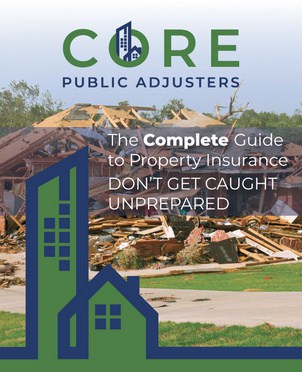There are three situations when you have property damage where insurance providers will tell you not to bother filing a claim. In this article we’ll explain these three situations and provide an alternative point of view.
Your deductible is more than the cost of repairs.
If your deductible is higher than what it will cost to repair your damage, don’t bother submitting a claim with your insurance company. This seems like common sense, however, there’s more to the decision. If you know with certainty 1) the full extent of your damage, and 2) the cost to repair it, then you have all of the information you need to determine if your deductible is higher or lower than the cost of repairs. For example, if a tree falls on your fence, you will need to repair or replace the panels that have been damaged. You can see the full extent of the damage and you can fairly easily determine the cost to repair it.
In other cases, though, it may not be that easy to know with certainty 1) the full extent of your damage, and 2) the cost to repair it. For example, if a tree falls on your roof shaking loose a few shingles, you may mistakenly believe that replacing a few shingles is the extent of the repair, while greater damage lingers below the surface like mold between your walls. When it comes to assessing complex damage, most of us are neither general contractors nor professional tradesman equipped to determine scope and cost of repairs.
You can call experts to provide you with estimates of your damage. When in doubt, you can always call CORE Public Adjusters and we’ll help you determine the cost of repairs and determine if those damages are covered under your policy. Which leads us to #2.
Your insurance policy doesn’t cover the damage.
There are a few clear cut cases where your insurance policy will not cover your damage. For example, insurance policies do not cover damage resulting from floods. Flood damage is covered under a separate policy and is available only through the government-run National Flood Insurance Program. Don’t bother submitting a claim with your homeowners insurance.
Other cases are not so clear cut. When you call your insurance company to report damage, they will review the details of your policy and tell you whether or not your policy covers the damage you are reporting. You should not always assume that their interpretation of your policy is correct. Insurance companies often mistakenly deny claims due to wrongly interpreting the insurance policy or misdiagnosing the cause or origin of damage. Many homeowners have successfully reversed claim denials and received settlements from their insurance companies with the help of expert public adjusters.
You can always call CORE Public Adjusters for an expert review of your situation. One of our experts will review your policy and your damage to determine if a reversal of a denied claim is possible.
Damage resulted from lack of proper maintenance.
Damage resulting from lack of proper maintenance is one reason why your insurance company may deny your claim. It’s important that you maintain your property inside and out, including appliance hoses, indoor and outdoor pipes, showers, sinks, and toilets, roofs, sewer drains, rain gutters, and hot water heaters.
When it comes to submitting claims for damage resulting from lack of maintenance, some cases are clear cut while others are not. If wind blows down your rotting fence, then don’t bother submitting a claim. On the other hand, if you have a shower drain that backs up and results in floor damage, lack of proper maintenance may not be the cause at all. There are numerous instances of insurance companies wrongly denying claims citing “lack of proper maintenance” as the reason for the denial. Don’t allow your insurance company to blame you for something that is not your fault.
You can always call CORE Public Adjusters and we’ll provide you with our expert opinion of the situation.
Thank you for reading this important article. We’re honest, transparent, and boldly different. We’re CORE Public Adjusters. Contact us and we’ll help you determine if your claim is worth submitting.







